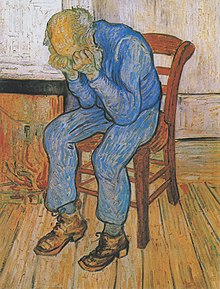| Psychological pain | |
|---|---|
| Other names | Suffering, mental agony, mental pain, emotional pain, algopsychalia, psychic pain, social pain, spiritual pain, soul pain |
 | |
| Vincent van Gogh's 1890 painting Sorrowing old man ('At Eternity's Gate'), where a man weeps due to the unpleasant feelings of psychological pain. | |
| Specialty | Psychiatry, psychology |
| Medication | Antidepressant medication, Analgesic medication |
Psychological pain, mental pain, or emotional pain is an unpleasant feeling (a suffering) of a psychological, non-physical origin. A pioneer in the field of suicidology, Edwin S. Shneidman, described it as "how much you hurt as a human being. It is mental suffering; mental torment."[1] There are numerous ways psychological pain is referred to, using a different word usually reflects an emphasis on a particular aspect of mind life. Technical terms include algopsychalia and psychalgia,[2] but it may also be called mental pain,[3][4] emotional pain,[5] psychic pain,[6][7] social pain,[8] spiritual or soul pain,[9] or suffering.[10][11] While these clearly are not equivalent terms, one systematic comparison of theories and models of psychological pain, psychic pain, emotional pain, and suffering concluded that each describe the same profoundly unpleasant feeling.[12] Psychological pain is widely believed to be an inescapable aspect of human existence.[13]
Other descriptions of psychological pain are "a wide range of subjective experiences characterized as an awareness of negative changes in the self and in its functions accompanied by negative feelings",[14] "a diffuse subjective experience ... differentiated from physical pain which is often localized and associated with noxious physical stimuli",[15] and "a lasting, unsustainable, and unpleasant feeling resulting from negative appraisal of an inability or deficiency of the self."[12]
- ^ Shneidman ES (1996). "Appendix A Psychological Pain Survey". The Suicidal Mind. Oxford University Press. p. 173. ISBN 9780195118018.
- ^ Psychalgia: mental distress. Merriam-Webster's Medical Dictionary. But see also psychalgia in the sense of psychogenic pain.
- ^ Weiss E (1934). "Bodily pain and mental pain". The International Journal of Psychoanalysis. 15: 1–13.
- ^ Orbach I, Mikulincer M, Gilboa-Schechtman E, Sirota P (2003). "Mental pain and its relationship to suicidality and life meaning". Suicide & Life-Threatening Behavior. 33 (3): 231–41. doi:10.1521/suli.33.3.231.23213. PMID 14582834.
- ^ Bolger EA (1999). "Grounded theory analysis of emotional pain". Psychotherapy Research. 9 (3): 342–62. doi:10.1080/10503309912331332801 (inactive 1 November 2024).
{{cite journal}}: CS1 maint: DOI inactive as of November 2024 (link) - ^ Joffe WG, Sandler J (1967). "On the concept of pain, with special reference to depression and psychogenic pain". Journal of Psychosomatic Research. 11 (1): 69–75. doi:10.1016/0022-3999(67)90058-X. PMID 6049033.
- ^ Shattell MM (May 2009). "Why does "pain management" exclude psychic pain?" (PDF). Issues in Mental Health Nursing. 30 (5): 344. doi:10.1080/01612840902844890. PMID 19437255. S2CID 29799238.
- ^ Macdonald G, Leary MR (March 2005). "Why does social exclusion hurt? The relationship between social and physical pain" (PDF). Psychological Bulletin. 131 (2): 202–23. doi:10.1037/0033-2909.131.2.202. PMID 15740417. S2CID 10540325. Archived from the original (PDF) on 2014-03-01.
- ^ Spiritual pain: 60,000 Google results. Soul pain: 237,000 Google results.
- ^ Morse JM (September 2001). "Toward a praxis theory of suffering". Advances in Nursing Science. 24 (1): 47–59. doi:10.1097/00012272-200109000-00007. PMID 11554533.
- ^ Rehnsfeldt A, Eriksson K (September 2004). "The progression of suffering implies alleviated suffering". Scandinavian Journal of Caring Sciences. 18 (3): 264–72. doi:10.1111/j.1471-6712.2004.00281.x. PMID 15355520.
- ^ a b Meerwijk EL, Weiss SJ (2011). "Toward a unifying definition of psychological pain". Journal of Loss & Trauma. 16 (5): 402–12. doi:10.1080/15325024.2011.572044. S2CID 144462525.
- ^ Wille RS (2011). "On the capacity to endure psychic pain". The Scandinavian Psychoanalytic Review. 34: 23–30. doi:10.1080/01062301.2011.10592880. S2CID 144997538.
- ^ Orbach I, Mikulincer M, Sirota P, Gilboa-Schechtman E (2003). "Mental pain: a multidimensional operationalization and definition". Suicide & Life-Threatening Behavior. 33 (3): 219–30. doi:10.1521/suli.33.3.219.23219. PMID 14582833.
- ^ Mee S, Bunney BG, Reist C, Potkin SG, Bunney WE (December 2006). "Psychological pain: a review of evidence". Journal of Psychiatric Research. 40 (8): 680–90. doi:10.1016/j.jpsychires.2006.03.003. PMID 16725157.